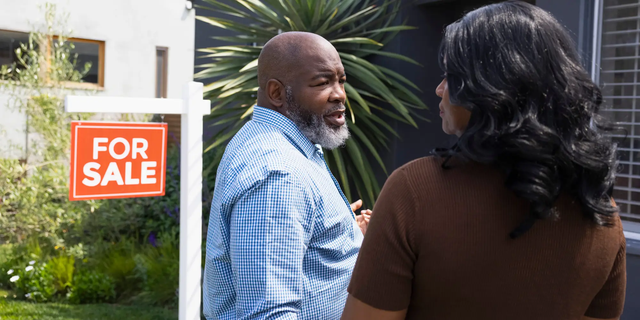
Jennifer Streaks
Oct. 27, 2023
Becoming a homeowner after years of renting is an exciting time. When it happened for me, I felt accomplished and like I had my financial life in order.
But buying a home is one of the biggest financial decisions you will make — and can come with the potential for many pitfalls. When I bought my home, it needed renovations in the kitchen and the bathrooms, the most expensive areas to renovate in a home. I went into it seeing all of the potential that was there, but it wasn't until I really started the process that I saw the expense of it all.
A new home can be a license to spend money and leave you wiped out if you are not careful. My father, who by that time had been a homeowner longer than I had been alive, gave me some really great advice for managing it all.
Here are three tips from my dad that helped me when I first bought my home:

The author is not pictured. The Good Brigade/Getty Images
1. Don't overspend as soon as you move in
By the time you move into your home, you have handed over a large part of your savings for a mortgage down payment, closing costs, and moving expenses. Money will definitely be tight — and maybe for a while — because your savings are depleted, and monthly expenses may also be higher as well, thanks to the new costs that come with homeownership such as water, higher electric bills, and extra homeowners insurance.
Of course I was ready to personalize my new home and upgrade what may have been temporary apartment furniture for something nicer, but my dad advised that I shouldn't go on a massive spending spree to improve everything all at once. Just as important as getting my first home was staying in it, and as much as I wanted to immediately renovate the kitchen — I had already reached out to a contractor — it wasn't worth jeopardizing my financial stability.
Give yourself time to adjust to homeownership's expenses and rebuild your savings account — the kitchen will still be waiting for you when you can do more.
2. Don't put off necessary maintenance
One of the new expenses that accompany homeownership is making repairs. There's no landlord to call if your roof is leaking or your toilet is clogged. When I moved into my home, the windows needed to be replaced, to the point that the downstairs was ice cold during the winter and the electric bill was over $500 a month. But since that wouldn't be as aesthetically pleasing as renovating the kitchen or getting a glossy new bathroom, I wasn't in a rush to do it. My dad let me know I was actually costing myself money.
By not taking care of a necessary window replacement, I was paying a higher electric bill and inconveniencing myself every time I went downstairs wrapped in a blanket.
While you should exercise restraint in purchasing the nonessentials, you shouldn't neglect any problem that could worsen over time. Delay can turn a relatively small problem into a much larger and costlier one, and in a home everything works together for better or for worse. Have a water leak? Now you have a higher water bill (and maybe water damage). Need new energy efficient windows? You will pay a higher electric bill until you get them replaced.
3. Invest now so you only have to pay once
I will fully admit that I was in love with the bones of my home: the high ceilings, the staircase, the fireplace, the yard, and the location. But there were several serious elements of the house that needed replacing, and that was going to be expensive. The water heater, the furnace, and the washer/dryer all needed to be replaced, not to mention smaller items like ceiling fans and window treatments.
So of course, when getting estimates, in the beginning, I would gravitate towards the cheapest price. My dad said, "There is no reason to buy the cheapest version and be right back here in two years. Invest now so you only have to pay once." After that I always asked for three options and landed on the middle number.
You may not need the most expensive option with the name brand and all of the extra bells and whistles, but the cheapest option is typically cheap for a reason and could cost you more money down the road.
Subscribe to Business Insider's Financial Insights Newsletter
This Business Insider article was legally licensed by AdvisorStream


